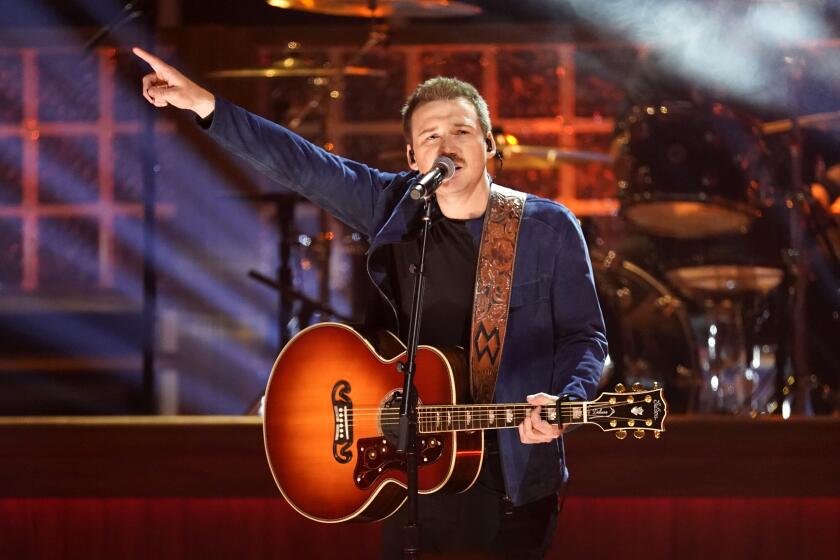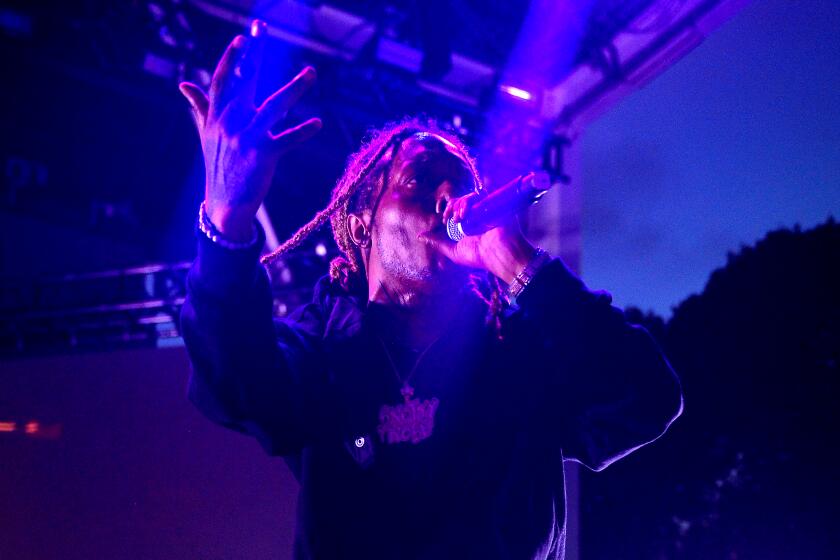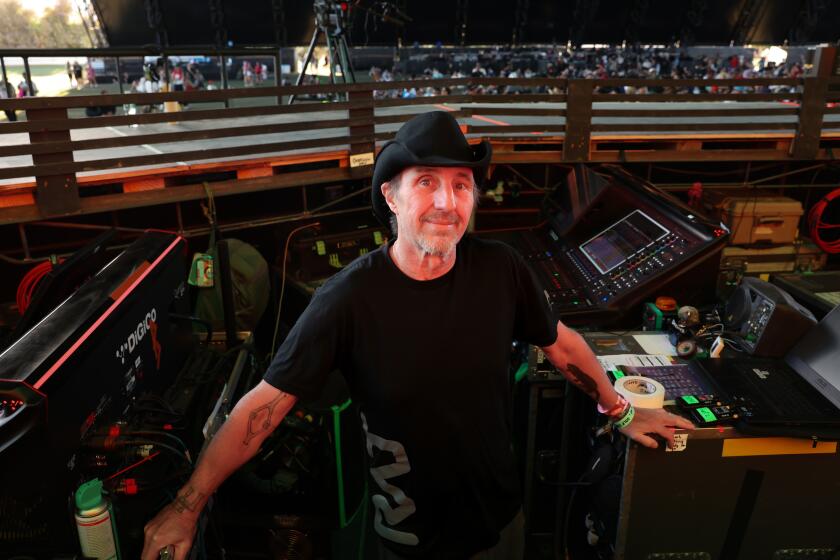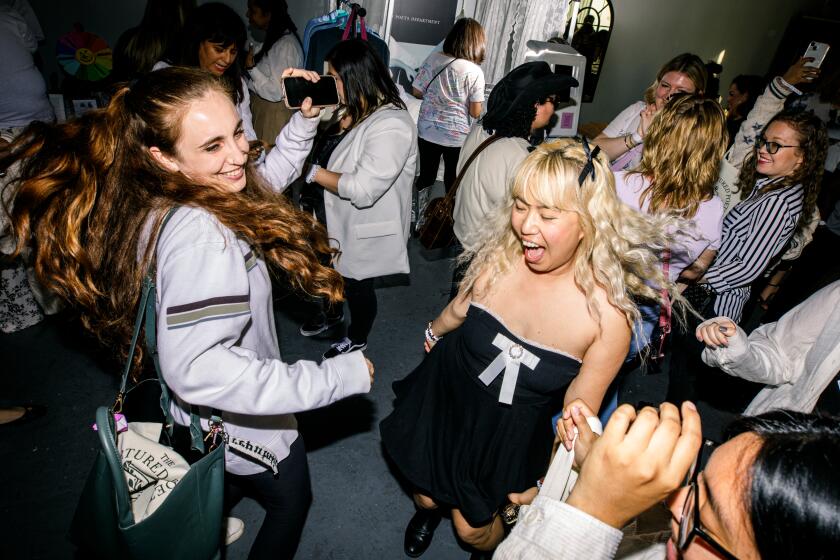Welcome to the jungle
IT’S opening night of the Arctic Monkeys’ first formal U.S. tour and 20-year-old Alex Turner leans into the microphone to spit out the opening line to a song about how too much anticipation has a way of setting you up for disappointment.
Turner wrote that line months ago, one of the many wry observations about the dreams and disappointments of coming of age in gritty northern England that has made the Monkeys’ raw, guitar-driven album one of the most celebrated British debuts in years.
But the singer, whose slim frame and shy, disarming manner on stage makes him seem like Conor Oberst’s long-lost English cousin, may be thinking on this night about the Monkeys’ own recent ups and downs.
Things started off spectacularly this year when the quartet’s CD, “Whatever People Say I Am, That’s What I’m Not,” became the fastest-selling debut ever in England (350,000 copies in its first week), thanks to massive, fan-fueled Internet exposure.
The CD was met with rave reviews when released here, and “Saturday Night Live” rewarded the band with a coveted guest performance spot.
The Monkeys have even been hailed as master strategists whose Internet popularity could be a blueprint for bands that want to sidestep the formal record business machinery. All these subplots have made the Monkeys the most written-about British rock group since the emergence of Coldplay.
What goes up so fast in the rock world, however, usually encounters turbulence, and it’s definitely seatbelt time for the Monkeys.
Hundreds of bands strive each year for this kind of attention, and for the few who get it, it’s a moment of truth. Some wilt under the pressure, others thrive on it. The Monkeys -- four down-to-earth young men who were still rehearsing in Turner’s family garage and dreaming of making a record just three years ago -- are simply trying to ignore it and stay focused on their music.
It hasn’t been easy.
In this country, some rock observers are already grumbling that the band’s days may be numbered because the U.S. CD sales haven’t come close to duplicating the British success. After entering the U.S. chart at No. 24 on March 1, “Whatever People Say” fell to No. 52 two weeks later, and radio airplay, even on rock stations, has been minimal.
This rush to judgment has caused frustration in the Monkeys camp.
“It’s ridiculous, to be honest,” says Kris Gillespie, director of the group’s U.S. indie record label, Domino. “This is a band that is only starting to tour here, and we’ve already sold 100,000 records. I think everybody’s expectations were thrown so out of kilter by those first-week sales in England.”
Jeff Pollack, who advises MTV and numerous radio stations about musical programming, seconds Gillespie’s words of caution. “People have to give new bands time to develop,” he says. “Imagine if we had sat in judgment over U2 or R.E.M.’s commercial potential after their first album.
“The first week or even first month’s sales mean almost nothing here for a British band. The U.S. is a different market. It’s so much bigger and more complex. That’s why so many British bands don’t make it here. What you need to look at is not how much they are selling but how good they are.”
On that scale, the Monkeys stand out. The group’s album is filled with the sound of rock ‘n’ roll marking another generational switch in England, a burst of attitude that is equal parts artistry and audacity.
The band is firmly rooted in the grand, guitar-happy tradition of British pop-rock forces, from the Kinks and the Jam to the Stone Roses and the Libertines, that have written about the rites and rituals of life in the neighborhood clubs and pubs -- songs filled with compelling insight, surprising tenderness and sometimes savage bite.
It may not bode well for the Monkeys’ commercial future that many of these acts never won a sizable following in this country. But they all did inspiring work.
“I think all this emphasis on sales is misguided,” Turner says backstage. “If you look at the Stone Roses or the Jam, you don’t think about how many records they sold but what great music they made. That’s what is....”
Guitarist Jamie Cook, sitting across the table, interrupts with a point about the streaking British sales that caused the media to expect so much of the band.
“To make it all even crazier, do you know who had that first-week sales record before us?” he asks. “Was it one of the really big bands? Oasis? Blur? Coldplay? No, it was Hear’Say. So what does that show?”
(Hear’Say, a TV reality show pop group, broke up a year after its chart success, declaring that the level of abuse from the public became too much.)
“It did feel good to beat them, but topping the charts was never our goal. We just wanted to make the best record we could. Now, I’d like us to be able to grow like the Clash. When they started, it was a very basic, punky record. Then they started to take off and move in lots of directions. That’s what we want.”
*
Hardly bucking for promotion
IF the Monkeys needed any reminder that they are still on the bottom rung of rock stardom in this country, the backstage scene on this opening night would do the trick.
The musicians are sitting in a dingy downstairs dressing room staring at a single plate of cold cuts in a club near downtown. The relatively sedate audience later will be more curious than committed.
Turner and Cook are joined in the band by bassist Andy Nicholson and drummer Matt Helders. For young musicians at the center of a media storm, the Monkeys, all longtime friends, seem unusually calm -- like college students on spring break. They even checked out one of the city’s most famous tourist spots, Alcatraz, on their day off here.
Most young bands would be spending every free moment doing phone interviews or visiting radio stations, but Turner scoffs at the thought.
“We’ve seen what it takes for most bands to happen in America, and it often seems as much about promotion as the quality of the music, and I just don’t see us doing all that,” he says.
“Besides, I remember hating it when it felt like bands were being shoved down your throat by record companies and the media. There is already all this talk about hype surrounding us, and it makes us uncomfortable. We certainly don’t want to add to it. We love playing shows, but forget the rest.”
Lots of managers would be trying to school the Monkeys in the advantages of promotion, but Geoff Barradale, who co-manages the Monkeys with Ian McAndrew, is wholly supportive. This was the only print-media interview they did on the West Coast.
In fact, it’s hard sometimes to know whether Barradale is following the band’s lead in this anti-promotion stance or whether he helped shape its low-profile stance.
“I can’t have them on the phone for five hours every day talking about themselves when there is music to be written and gigs to be played, which is stuff they want to do,” he says. “All that other stuff can destroy a band’s spirit. Sure, you do a few things, but you don’t do everything.”
Before he began managing the Monkeys three years ago, Barradale, now 45, was the singer in a relatively obscure rock band called Seafruit. Earlier he was in a group named Vitamin Z that was signed to Geffen in the U.S.
Deciding he was too old to be in a band, he thought it would be more fun to find an exciting act, one with passion and individuality, and help it achieve the success he never had.
With either great luck or remarkable insight, he saw those qualities in the Monkeys in 2003, when they were just a year out of high school and had written only three or four songs.
“I just thought there was this fantastic energy, the lyrics were interesting, but mainly they felt genuine,” he says. “They felt truthful to themselves, and that’s what’s missing in so many bands. Most are just copying other people because the most important thing to them is to get a record contract, and that’s the last thing they should be after.
“Record contracts are easy if you’ve really got something to offer, so we spent all of 2004 making sure we had something to offer musically.”
Barradale took the band into the recording studio to make demos and drove them to gigs, mostly in out-of-the-way clubs that kept them under the London record company radar.
Early on, the Monkeys handed out copies of their demo recordings free at shows, hoping people would take them home and learn the words. Sure enough, fans came back to sing along.
Hate to blow the band’s reputation as Internet masterminds, but it was those fans, eventually by the thousands, who put the Monkeys’ recordings on Internet sites, such as MySpace.com, for others to hear for free.
Enough people apparently liked what they heard that their first commercial single entered the chart at No. 1 in England last fall, as did the album in January. That showing has fueled expectations that fan-based music sites will greatly alter the traditional relationship between musicians and major record companies.
Though several routine groups, and even a few good ones, have used the Internet to help build a following, the Monkeys’ ascent -- which involved the sexy combustion of great music and that flashy, out-of-nowhere appearance at the top of the charts -- captured imaginations in and out of the music industry.
Bypassing major labels, the Monkeys joined the roster of Domino, the indie home in England of such acts as the late Elliott Smith and Franz Ferdinand, figuring it would be a healthier and more supportive atmosphere.
“The funny thing about all the hype talk is that we went out of our way to avoid the high-pressured marketing side of the music business,” Barradale says. “We could have probably doubled or tripled our sales in England if we had been willing to do everything we could to promote the album. So, clearly, that’s not what we are about.”
*
A rumbling collage of sounds
YOU see why fans in England went crazy over the Monkeys as soon as the band takes the stage at the Great American Music Hall. The group doesn’t represent a revolutionary departure a la the Sex Pistols or even Nine Inch Nails, but it carries the tradition of intense, street-level British rock forward.
The music pulls many of the most appealing strains of British rock -- the punk insistence of the Clash, the melodic urgency of the Jam and even some ska bounce -- into a rumbling collage that grabs you by the collar. Then, suddenly, the group can turn on a dime to deliver music as delicate as a snowflake, only to pick up the tempo again with an almost skip-along charm.
Most absorbingly, Turner’s songs speak about the struggles involved in searching for a life beyond childhood boundaries, physical and emotional. The lyrics are sometimes filled with so much English slang that you wish the album came with a translation sheet, but the heart of the Monkeys’ message has a universal ring.
There’s playfulness in “I Bet You Look Good on the Dancefloor” that winks at sexual infatuation, while “Riot Van” speaks a bit more anxiously about the ongoing tension between young rebels and police. In the especially moving “A Certain Romance,” Turner writes about how young people try to separate themselves with fashion statements but really are bound by similar desires and doubts.
Well, oh, they might wear classic Reeboks
Or knackered Converse
But all of that’s what the point is not
The point’s that there isn’t no romance around here.
Later in the song, Turner even comments on the bleakness of much mainstream pop:
There’s only music
So that there’s new ringtones.
What breathes life into the themes and aggressive, raucous musical arrangements are modern sensibilities that reflect hip-hop influences and other contemporary thought. Turner’s vocals and lyrics have much of the same personal commentary that marks the work of Mike Skinner, the British rapper known as the Streets.
But there’s also an intangible at work that adds greatly to the Monkeys’ appeal. Some bands just seem like a bunch of guys (or gals) on stage. Others, all the way back to the Beatles and U2, come across as actual mates, bonded by their middle-class roots and a common passion.
The Arctic Monkeys have been a pack since their school days in the old steel town of Sheffield, giving them a background so shared that all four give the same answer when asked to name the first band that truly excited them. It was Oasis, whose first two albums were portraits of youthful swagger and desire that achieved a popularity of almost Beatlesque proportions in ‘90s England.
“I don’t think I ever wanted to be like Oasis,” Turner says, sitting in the dressing room, tugging at his hooded sweatshirt. “I just remember them playing football stadiums back home and I thought it was amazing, the fact that they could move that many people, that music could touch people in that way. That’s what really intrigued me.
“I used to like making about with stuff, playing piano and things, but I didn’t really get into records until I was older and I started listening to rap music.” He cites Roots Manuva, a British rapper, as a special influence.
The real move toward music for the foursome began in summer 2002. Turner, Nicholson and Cook all played guitar, so Helders volunteered to learn how to play drums.
“What really triggered us,” Helders says, “was when a bunch of exciting new bands came along at the same time -- the Strokes, the White Stripes, the Hives, that whole bunch. They had such energy and passion. We started out playing Strokes and Stripes songs in Alex’s family garage.”
“When we started writing songs,” Nicholson adds, “we didn’t know what we wanted to sound like, but we knew what we didn’t want to sound like. We didn’t want to do what had already been done. Sure, you’ll find influences in our music, but we wanted something that felt our own.”
*
Encouraging news
TWO days later, the Monkeys are on stage at the Henry Fonda Theatre in Hollywood, and the mood is upbeat. The audience is younger and more responsive than it had been in San Francisco. Major label record company heads squeeze in alongside fans.
For those keeping track on the business front, the news is encouraging. Thanks to the “Saturday Night Live” appearance and the start of the tour, the Monkeys album actually moved back up the chart -- from 52 to 42.
The first-month total of 98,000 was almost three times what James Blunt and Franz Ferdinand, two other hit makers from across the Atlantic, sold in their first month in the U.S., and both of their albums have sold 1 million copies.
But programming consultant Pollack warns again about putting too much stock in early sales. Blunt and Ferdinand, he notes, have sounds that are more compatible with pop radio and mainstream rock radio, respectively, and it’s that exposure that helped their albums go platinum. The Monkeys, whose music is more hard-core rock, are trying -- and struggling -- to get airplay on the alternative rock format, which comprises a much, much smaller group of stations.
Still, the Monkeys themselves are happy to be traveling through America and playing their music, as you’d expect from any group of twentysomethings from a rusty industrial town. They plan to return to the U.S. this summer.
On stage, Turner needs to reach out more to the audience, a key in connecting with U.S. fans. Musically, however, the band has enormous promise, and new songs are coming fast.
Gazing out at the Hollywood audience about two-thirds of the way through the show, Turner good-naturedly acknowledged all the debate about the Monkeys in this country.
The slender singer said he hadn’t seen anyone leave yet. “Well, maybe one or two ... so I guess we’re doing OK.”
*
Contact Robert Hilburn at calendar.letters@latimes.com.
More to Read
The biggest entertainment stories
Get our big stories about Hollywood, film, television, music, arts, culture and more right in your inbox as soon as they publish.
You may occasionally receive promotional content from the Los Angeles Times.






